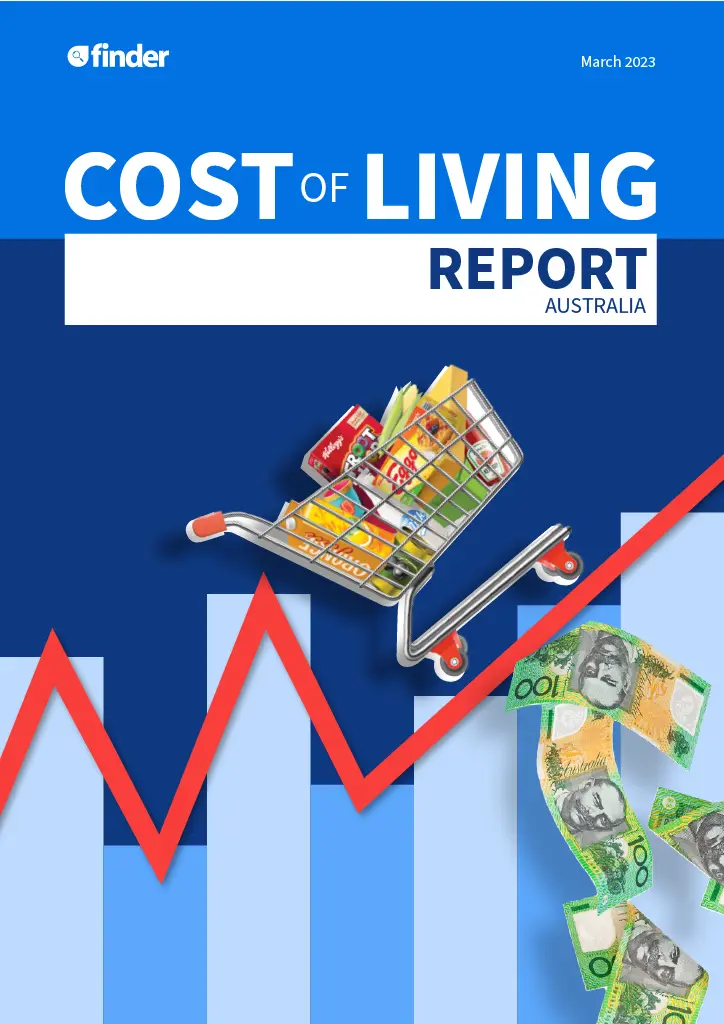Looking for more details on household spending? Check out Australian household spending statistics for more information on how households budget their money.
Cost of living report 2023
How are Australian households faring among rising inflation and interest rates?
 In the last few years and particularly over the last 12 months, the cost of living has soared dramatically, making it increasingly difficult for many Australians to afford their basic needs. Consumers are feeling the financial burden, from rising prices of food and petrol and the higher costs of health care and education to the major pressure on both rents and mortgages.
In the last few years and particularly over the last 12 months, the cost of living has soared dramatically, making it increasingly difficult for many Australians to afford their basic needs. Consumers are feeling the financial burden, from rising prices of food and petrol and the higher costs of health care and education to the major pressure on both rents and mortgages.
This report seeks to examine the causes and consequences of the rising cost of living as well as explore potential solutions to help consumers cope with these challenges. We have drawn on a wide range of sources from Finder, the government and other reputable third-party data providers. We incorporated economic data, academic research, market and consumer behaviour insights and expert opinion to provide a comprehensive overview of the issue.
Download the cost of living report.
Key cost of living statistics
- Households were paying 7.8% more for goods and services in December 2022 compared to the same period in 2021.
- 94% of survey respondents noticed an increase in their weekly grocery shop.
- Consumers are spending an extra $37 per week on groceries, an additional $1,924 a year.
- 43% of consumers are stressed about their grocery costs.
- 1 in 3 Australians have asked friends or family for financial help in the past 12 months.
- Rate rises have added over $12,000 to the annual cost of servicing a $600,000 mortgage.
- 429,000 households missed a mortgage repayment in the second half of 2022.
- An extension of free childcare is supported by 70% of Australians.
Food is the main non-housing expense driving increased inflation
The Australian consumer price index (CPI), the primary indicator of the nation's cost of living, reveals the other categories behind the rise of inflation. These include furnishings and furniture (6.6%), recreational costs (6.4%), and transport (5.6%).
Stress around housing, grocery, petrol and energy costs has been steadily increasing
Each month, Finder's Consumer Sentiment Tracker asks consumers which household expenses, if any, are causing financial stress. The question covers 19 different expense types, with each user able to nominate up to 3 expenses causing financial stress. The most commonly nominated expenses are housing costs (rent/mortgage), groceries, petrol and energy. The percentage of households citing these expenses as a cause of stress has been increasing steadily since 2021.
The average Australian has lost almost a month of their perceived savings buffer since the beginning of 2021
The sharp increase in grocery prices and housing costs has had a considerable impact on how long Australians think their funds could last in an emergency. Every month, Finder asks panellists how long they could live off their savings if they lost their job.
The perceived savings buffer of the average Australian sits at 14–15 weeks, down from around 18 weeks (3-month rolling average). When looking at our last cost of living report published in May 2022, there has been a significant increase in consumers from the middle-income bracket saying they could only live off their savings for 1 week or less.
Download the full report to read more.
More guides on Finder
-
Economic snapshot: 4 things to watch this month
Get up to speed with the latest economic update, offering insights into Australia's financial landscape.
-
Finder Credit Card Report 2024
Finder's Credit Card Report investigates the emerging consumer behaviours and industry trends in Australia's credit card market.
-
Finder’s Cost of Living Pressure Gauge
Finder's Cost of Living Pressure Gauge measures the financial stress experienced by Australian households.
-
Finder Economic Positivity Index
Tracking the outlook of Finder's panel of economic experts.
-
Finder Consumer Positivity Index
Tracking how Australian consumers feel about the economy and their financial lives.
-
What makes people happy? Finder happiness statistics 2024
Finder study reveals financial security, being married, reliable Internet connection, and trust in the government make Aussies happy.
-
Savings account statistics 2024
The average Australian has $37,975 in savings and saves $705 each month. Learn about this and more with our savings account statistics.
-
Australian Property Half Time Report
Various data sources reveal just how resilient the Australian property market is.
-
Consumer Sentiment Tracker
Discover average home loan sizes around Australia and much more with our comprehensive guide to home loan statistics.
-
Australia’s Christmas Spending 2018
Aussies are doing Christmas on a budget this year.
Ask a Question
